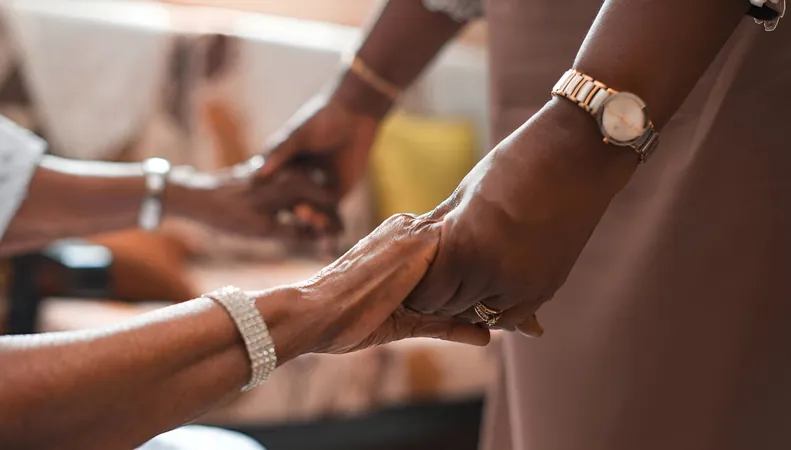
Africa Faces Dementia Crisis: The Urgent Need for Research and Innovation
2024-10-09
Author: Nur
Dementia is rapidly emerging as a significant public health crisis in Africa, coinciding with the continent's aging population. Current statistics reveal that in 2015, over 2 million individuals in Sub-Saharan Africa were living with dementia. Alarmingly, projections suggest this number could soar to nearly 8 million by 2050, as reported by Alzheimer’s Disease International.
One of the most pressing challenges is the vast gap in research and understanding regarding dementia specific to the African context. Experts emphasize that genetic research could play a crucial role in bridging these gaps and underscore the necessity for collaboration among researchers, the private sector, and government entities. Leveraging new technologies for early detection and enhancing community engagement are also pivotal to addressing this growing issue.
George Vradenburg, the founding chairman of the Davos Alzheimer's Collaborative, stated, “If we collaborate, we will have much more power than if we act alone.” His insights stress the urgency for combined efforts to maximize the impact and speed of developments regarding dementia research.
Understanding Dementia
Dementia encompasses a range of brain disorders that lead to cognitive decline, including memory loss and difficulties with everyday tasks. Alzheimer's disease, which accounts for approximately 70% of dementia cases globally, remains the most recognized form. The World Health Organization (WHO) estimates that over 55 million people globally suffer from dementia, with about 10 million new diagnoses each year. Notably, low- and middle-income countries are home to around 60% of these cases, where populations are undergoing rapid aging.
The Promise of Genetic Research
Vradenburg highlights that Africa's unique genetic and environmental factors present a treasure trove of insights into dementia. “The microbiome and environmental stresses in Africa are different. The diversity of African genetics is going to teach us a lot,” he remarked at a recent conference in Nairobi.
Research shows that over a third of individuals of African descent carry genetic risk factors linked to Parkinson's disease, which can precede dementia, signaling an urgent need for further studies that could unveil significant revelations regarding Alzheimer's and other dementia-related conditions.
Tackling the Stigma
In numerous African communities, dementia is often shrouded in misconceptions and stigma, with beliefs sometimes attributing the illness to witchcraft. Such views can lead to delays in both diagnosis and treatment. Efforts to combat this stigma in Kenya have included collaborations with traditional and religious healers, which have proven effective in improving access to care. David Ndetei, director of the Africa Institute of Mental and Brain Health, noted, “We respect traditional views but also advocate for medical perspectives, fostering an inclusive dialogue that ultimately benefits patients.”
Innovative Detection Methods
The pursuit of early detection innovations is crucial, and new technologies are being tested. In Tanzania, a research initiative focusing on voice pattern analysis aims to flag potential dementia risks. The team, led by Biostatistician Jim Todd, is developing a digital tool intended to correlate changes in voice with cognitive decline indicators found in blood tests.
Todd mentions, “We’re analyzing 65 priority features” to monitor cognitive shifts over time, indicating a promising and cost-effective method for early intervention.
Holistic Approaches to Brain Health
Beyond technological advances, the significance of holistic methods for brain health is gathering attention. Razak Gyasi, an associate research scientist at the African Population and Health Research Center, advocates for lifestyle modifications—such as diet, exercise, and social engagement—as vital components of mental well-being in older adults. His studies in Ghana highlight the effectiveness of traditional practices, including massage therapy and music therapy, underscoring the importance of culturally relevant care in tackling mental health issues.
The Call for Global Partnerships
As dementia cases continue to rise, Vradenburg calls for collaborative efforts among researchers, businesses, and governments to spearhead advancements in diagnosis and therapeutic strategies. He likens the need for collective action in dementia research to the successful partnerships formed in the battle against HIV/AIDS, which have yielded substantial progress in treatment and care.
In conclusion, Africa stands at a crossroads in addressing the impending dementia crisis. With the right investments in research, early detection technologies, and community engagement, there lies significant potential to reshape the narrative around dementia on the continent. It’s time for action—together we can make a difference!


 Brasil (PT)
Brasil (PT)
 Canada (EN)
Canada (EN)
 Chile (ES)
Chile (ES)
 España (ES)
España (ES)
 France (FR)
France (FR)
 Hong Kong (EN)
Hong Kong (EN)
 Italia (IT)
Italia (IT)
 日本 (JA)
日本 (JA)
 Magyarország (HU)
Magyarország (HU)
 Norge (NO)
Norge (NO)
 Polska (PL)
Polska (PL)
 Schweiz (DE)
Schweiz (DE)
 Singapore (EN)
Singapore (EN)
 Sverige (SV)
Sverige (SV)
 Suomi (FI)
Suomi (FI)
 Türkiye (TR)
Türkiye (TR)